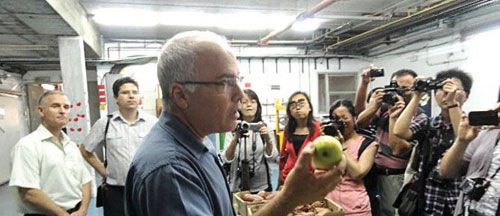.jpg)
.jpg)
Israeli researcher AmnonLichter held two very different apples in his hands. One had been sitting in the fridge for months, rotting, brown and sad-looking. In the other hand was a bright green fruit. Both were picked at the same time, months ago.
What set the two apples apart was a simple Israeli technology developed at Israel’s Volcani Center––a government-run agricultural research organization where 70 percent of Israel’s agricultural advances are born with the help of hundreds of scientists.
According to Lichter, who works in postharvest at Volcani, about half of all a farmer’s resources go into postharvest treatment. This is any time after the fruits, vegetables or flowers are picked until they arrive at the customer’s home.
“We are trying to minimize loss with a decreasing use of chemicals,” he tells ISRAEL21c during a press tour of the center in Beit Dagan, near Rishon Le Zion.
Volcani scientists are developing a range of new-generation treatments and a means for measuring their results. Better postharvest results ensure that fewer foods and flowers are wasted, with less energy going into producing what eventually gets to the buyer.
In the case of those apples, they weren’t kept green by Snow White’s kiss, but through oxygen starvation, a technique being applied and studied in one of the Volcani labs.
“We are using nitrogen for a week to starve the apples of air,” says Lichter, showing the differences between apples treated with nitrogen and those that weren’t. “When they are starved of oxygen, the same apples can be stored for a year without going brown,” he says.
So far, this somewhat low-tech solution has not been applied in apples commercially but it is being used on pears, he says.
The treatment involves a non-toxic biochemical solution that is sprayed over the apple. Since the fruit is alive, it must respire. Without air, the apple turns to alternative modes of “breathing” and as a consequence the brownish phenolic compounds in the apples are reduced.
There are currently chemical means for long-term storage of apples on the market. But new standards enacted by governments worldwide are demanding fruit without chemical residue. This Israeli-made technique is one promising approach to the problem.
Even when a solution is marketed as “natural,” Lichter says one must be cautious: “Fungi are natural, but they can be dangerous.”
There is a similar problem with potatoes. When they spout and turn green, besides losing taste they can also generate a harmful chemical called solanine.
To stop potatoes from sprouting, Volcani researchers came up with a natural and safe solution: mint.
Generally Recognized As Safe (GRAS) by U.S. health authorities, the Volcani Center’s treatment involves a misty mint oil spray applied once a month when the potatoes are under cold storage.
There is a stark difference between the treated potatoes, which look almost fresh from the farm, and those untreated, which have large sprouts poking out of them. “It takes a monthly fumigation with mint oil to store potatoes this way,” says Lichter, pointing to the healthy ones.
This technique is currently commercially applied in Israel, where some 40 percent of potatoes reaching the local market are mint-treated.
Lichter shows off another Israeli achievement that has changed the cut-herb industry—again a somewhat simple invention, but one that works wonders. In the past, Israel could never dream of exporting fresh herbs and spices to North America by ship. Now, when they are wrapped in plastic bags perforated with tiny holes, the herbs are able to get exactly the right moisture environment with no water buildup to make them wilted and rotten, Lichter explains.
He ends his tour in the postharvest taste room at Volcani—a sealed shed in the middle of a large lab where taste trumps science. “Our tasting groups are trained for specific species and cultivars and are trained how to taste for quality,” Lichter says.
The Volcani Center is a problem-solving hub for local farmers and for industry, government and NGOs who seek solutions to global food issues.Visitors are welcome, and if you come at the right time, tours of the Volcani orchards can be extra tasty—with fruit picked right from the tree.
By Karin Kloosterman, Israel 21c










